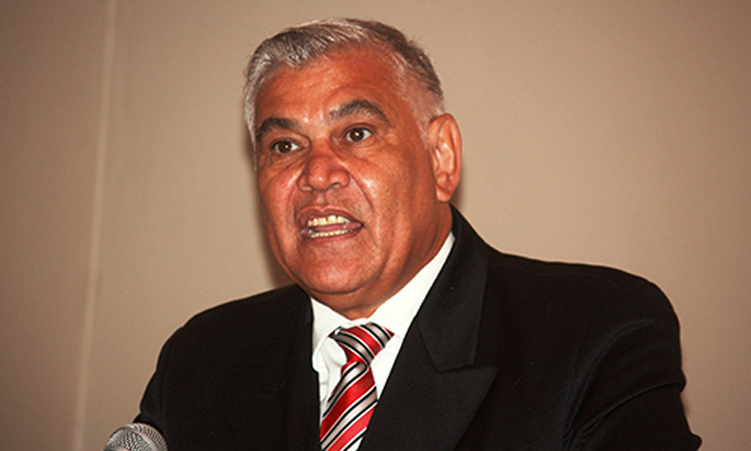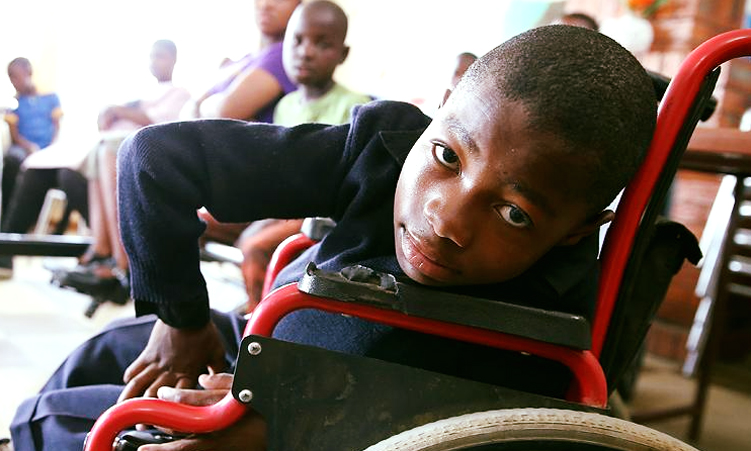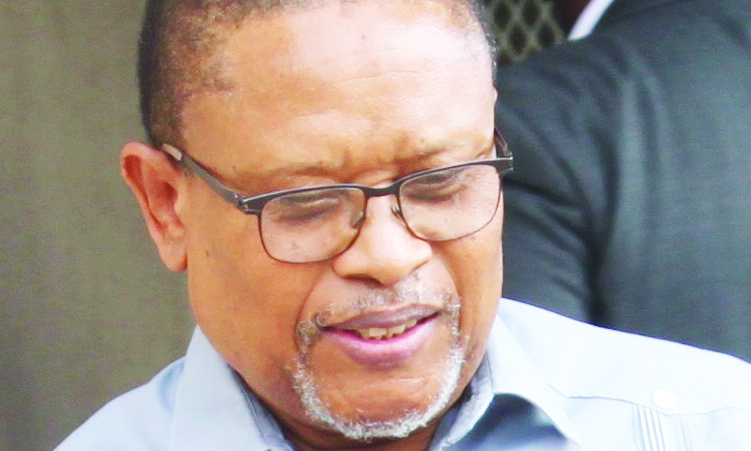THE last stages of the second Caprivi high treason trial started in the High Court in Windhoek yesterday in the absence of the 12 men who face charges – they were removed from the court twice because they started singing in the dock.
Deputy Prosecutor General Danie Small was only a few sentences into the address he planned to make to Acting Judge John Manyarara when the 12 accused, who are charged with committing high treason by trying to secede the Caprivi Region, rose to their feet in the dock and broke into song. Police officers promptly led them down to the basement below the courtroom.After the court took an adjournment the 12 were back in the dock.When given a chance to address the court, a spokesperson from their ranks, Vincent Siliye, repeated a statement that he and his co-accused have made since the start of the main part of their trial in March last year: that the 12 accused men do not consider themselves to be part of the trial.Siliye told the court that he and the other accused men were in court against their will.”We are standing here by force and under fear,” he stated, before asking Acting Judge Manyarara to excuse them from attending any further proceedings in the trial.The bulk of the trial has already taken place in the absence of the 12.As a result, none of the 53 witnesses who testified for the prosecution had any part of their testimony challenged in cross-examination on behalf of the 12.The accused have also chosen not to testify in their own defence, or to call any witnesses to give evidence in their defence.Siliye told the court that because – in his and the other accused men’s view – the prosecution had “failed in totality to prove that we are not Caprivians” the court was supposed to have discharged them at the close of the State’s case, or should at least now excuse them from further attending the trial “while you are still busy with your trial”.Siliye and his co-accused have also repeatedly told the court that because they are, in their firm belief, Caprivians by nationality and not Namibians, a Namibian court cannot try them on charges that they allegedly committed high treason against the Namibian State.Acting Judge Manyarara told Siliye that he and his co-accused could listen to Small’s closing argument on the judgement that has to be given by the court and that each of them will thereafter have an opportunity to respond to this address.If they insisted on being excused they would be excused, but with that step they would not assist their case, he added.That advice from the bench did not sway Siliye.He instead charged that the rights of the 12 were not being respected, that they were not equal before the law, and accused the Acting Judge of being “partial, very much unfair and very much biased”.”Our position is we want to leave now, immediately,” Siliye said.When Acting Judge Manyarara asked Small to start with his arguments after that, the 12 again rose from their seats and launched into song.They ignored a request from the Acting Judge not to start singing.They were again removed from the courtroom.Small told the court that if there was reasonable doubt in the court’s mind about the guilt of the accused they were entitled to be acquitted.He continued that a person would not be committing high treason by merely saying that he or she wanted the Caprivi Region to secede, and that any political party would also be entitled to have such an aim as part of its policies.What turns such a goal into high treason, however, is when it is pursued no matter what else happens and it goes over into overt acts being committed against the State.The accused have alleged that Namibia is illegally in control of the Caprivi and that they are Caprivians and not Namibians, but none of them have gone into the witness box to give evidence to substantiate these allegations, Small said.Taking the court through the history of the administration of the Caprivi Region, Small argued that it was clear that the region had since 1890 always been part of the territory of South West Africa and now Namibia.Evidence produced by the prosecution showed that each of the 12 men registered to vote in Namibia’s Independence elections in 1989, Small added.By doing this, he argued, they had to accept that they were either born in the territory of Namibia or ordinarily resident in the territory of Namibia at that time.The evidence further showed that four of them also applied for new Namibian identity documents after Independence, while eight of the accused registered as voters in post-Independence elections, Small added.This should show that they all owed allegiance to Namibia as a state.Small is set to continue addressing the court today.The 12 are Progress Kenyoka Munuma, Shine Samulandela Samulandela, Manepelo Manuel Makendano, Vincent Liswaniso Siliye, Vincent Khasu Sinasi, Alex Sinjabata Mushakwa, Diamond Samuzula Salufu, Frederick Isaka Ntambilwa, Hoster Simasiku Ntombo, Boster Mubuyaeta Samuele, John Mazila Tembwe and Alex Mafwila Liswani.They face six charges, including counts of high treason, sedition, and illegal importation and possession of firearms, in connection with allegations that they had taken part in an alleged plot to secede the Caprivi Region between September 1998 and December 2003.They have all been in custody since being arrested.The earliest of their arrests took place on July 18 2002, while the last arrests were carried out on December 12 2003.Police officers promptly led them down to the basement below the courtroom.After the court took an adjournment the 12 were back in the dock.When given a chance to address the court, a spokesperson from their ranks, Vincent Siliye, repeated a statement that he and his co-accused have made since the start of the main part of their trial in March last year: that the 12 accused men do not consider themselves to be part of the trial.Siliye told the court that he and the other accused men were in court against their will.”We are standing here by force and under fear,” he stated, before asking Acting Judge Manyarara to excuse them from attending any further proceedings in the trial.The bulk of the trial has already taken place in the absence of the 12.As a result, none of the 53 witnesses who testified for the prosecution had any part of their testimony challenged in cross-examination on behalf of the 12.The accused have also chosen not to testify in their own defence, or to call any witnesses to give evidence in their defence.Siliye told the court that because – in his and the other accused men’s view – the prosecution had “failed in totality to prove that we are not Caprivians” the court was supposed to have discharged them at the close of the State’s case, or should at least now excuse them from further attending the trial “while you are still busy with your trial”.Siliye and his co-accused have also repeatedly told the court that because they are, in their firm belief, Caprivians by nationality and not Namibians, a Namibian court cannot try them on charges that they allegedly committed high treason against the Namibian State.Acting Judge Manyarara told Siliye that he and his co-accused could listen to Small’s closing argument on the judgement that has to be given by the court and that each of them will thereafter have an opportunity to respond to this address.If they insisted on being excused they would be excused, but with that step they would not assist their case, he added.That advice from the bench did not sway Siliye.He instead charged that the rights of the 12 were not being respected, that they were not equal before the law, and accused the Acting Judge of being “partial, very much unfair and very much biased”.”Our position is we want to leave now, immediately,” Siliye said.When Acting Judge Manyarara asked Small to start with his arguments after that, the 12 again rose from their seats and launched into song.They ignored a request from the Acting Judge not to start singing.They were again removed from the courtroom.Small told the court that if there was reasonable doubt in the court’s mind about the guilt of the accused they were entitled to be acquitted.He continued that a person would not be committing high treason by merely saying that he or she wanted the Caprivi Region to secede, and that any political party would also be entitled to have such an aim as part of its policies.What turns such a goal into high treason, however, is when it is pursued no matter what else happens and it goes over into overt acts being committed against the State.The accused have alleged that Namibia is illegally in control of the Caprivi and that they are Caprivians and not Namibians, but none of them have gone into the witness box to give evidence to substantiate these allegations, Small said.Taking the court through the history of the administration of the Caprivi Region, Small argued that it was clear that the region had since 1890 always been part of the territory of South West Africa and now Namibia.Evidence produced by the prosecution showed that each of the 12 men registered to vote in Namibia’s Independence elections in 1989, Small added.By doing this, he argued, they had to accept that they were either born in the territory of Namibia or ordinarily resident in the territory of Namibia at that time.The evidence further showed that four of them also applied for new Namibian identity documents after Independence, while eight of the accused registered as voters in post-Independence elections, Small added.This should show that they all owed allegiance to Namibia as a state.Small is set to continue addressing the court today.The 12 are Progress Kenyoka Munuma, Shine Samulandela Samulandela, Manepelo Manuel Makendano, Vincent Liswaniso Siliye, Vincent Khasu Sinasi, Alex Sinjabata Mushakwa, Diamond Samuzula Salufu, Frederick Isaka Ntambilwa, Hoster Simasiku Ntombo, Boster Mubuyaeta Samuele, John Mazila Tembwe and Alex Mafwila Liswani.They face six charges, including counts of high treason, sedition, and illegal importation and possession of firearms, in connection with allegations that they had taken part in an alleged plot to secede the Caprivi Region between September 1998 and December 2003.They have all been in custody since being arrested.The earliest of their arrests took place on July 18 2002, while the last arrests were carried out on December 12 2003.
Stay informed with The Namibian – your source for credible journalism. Get in-depth reporting and opinions for
only N$85 a month. Invest in journalism, invest in democracy –
Subscribe Now!






